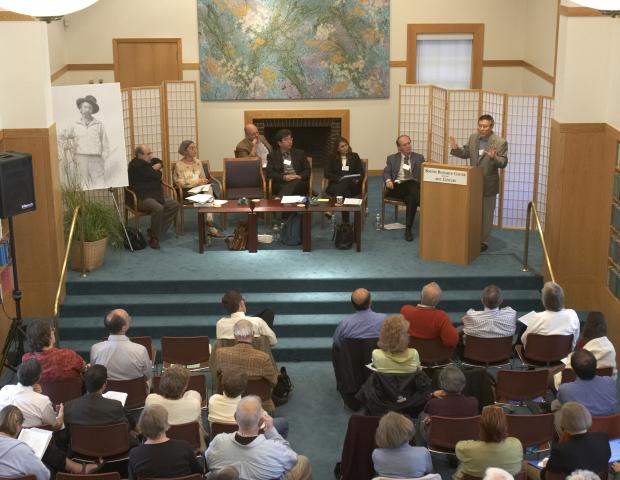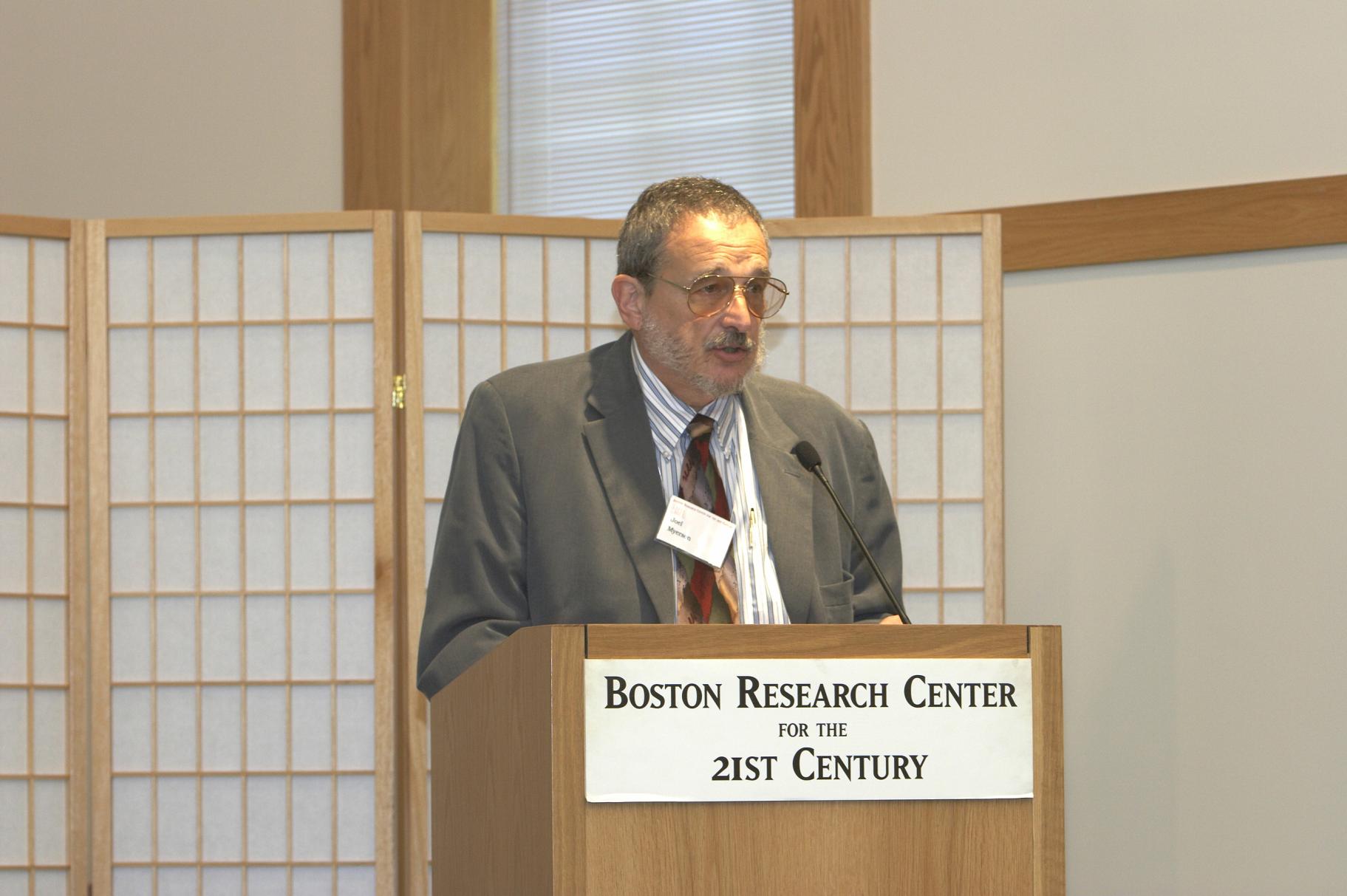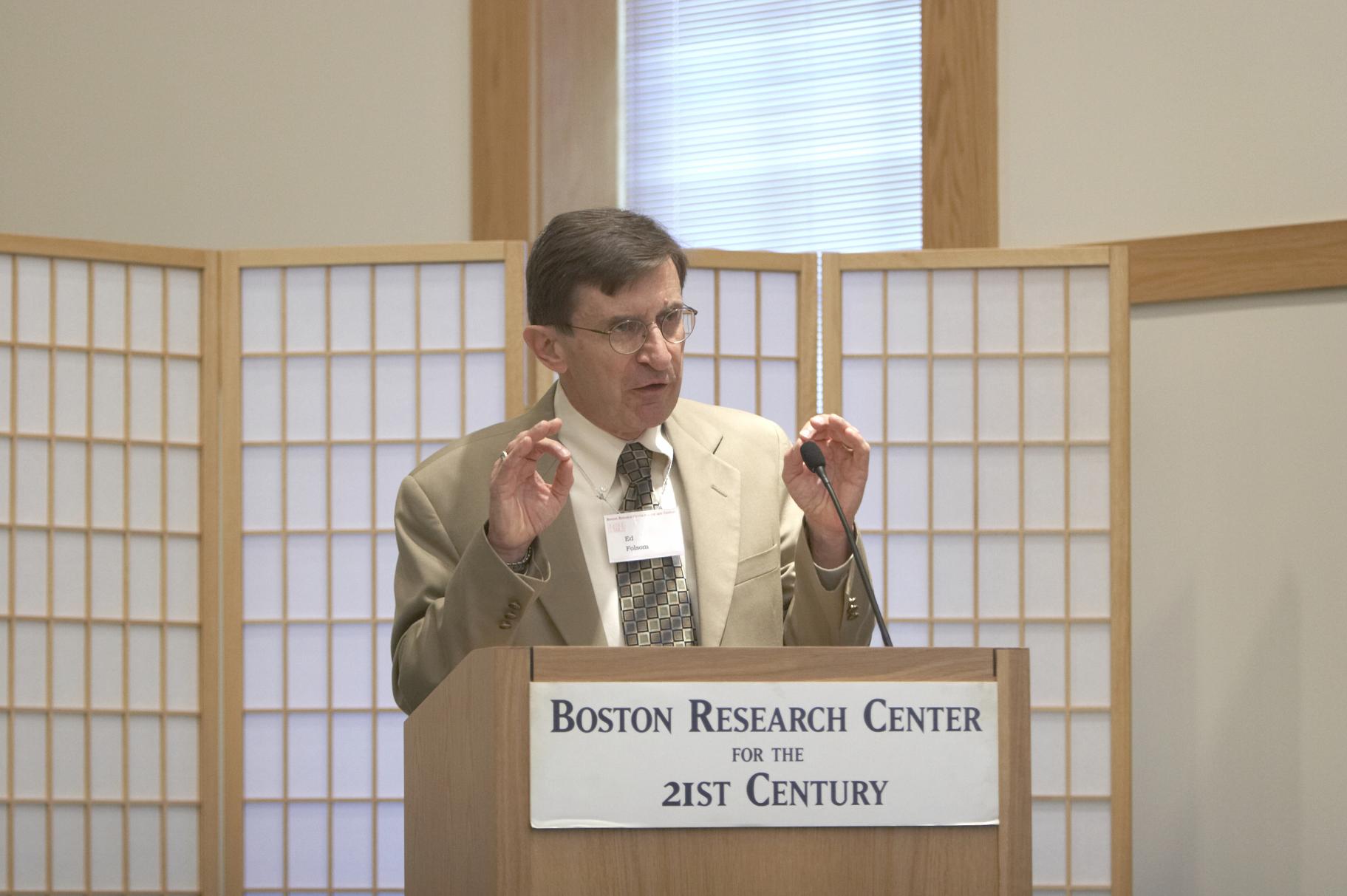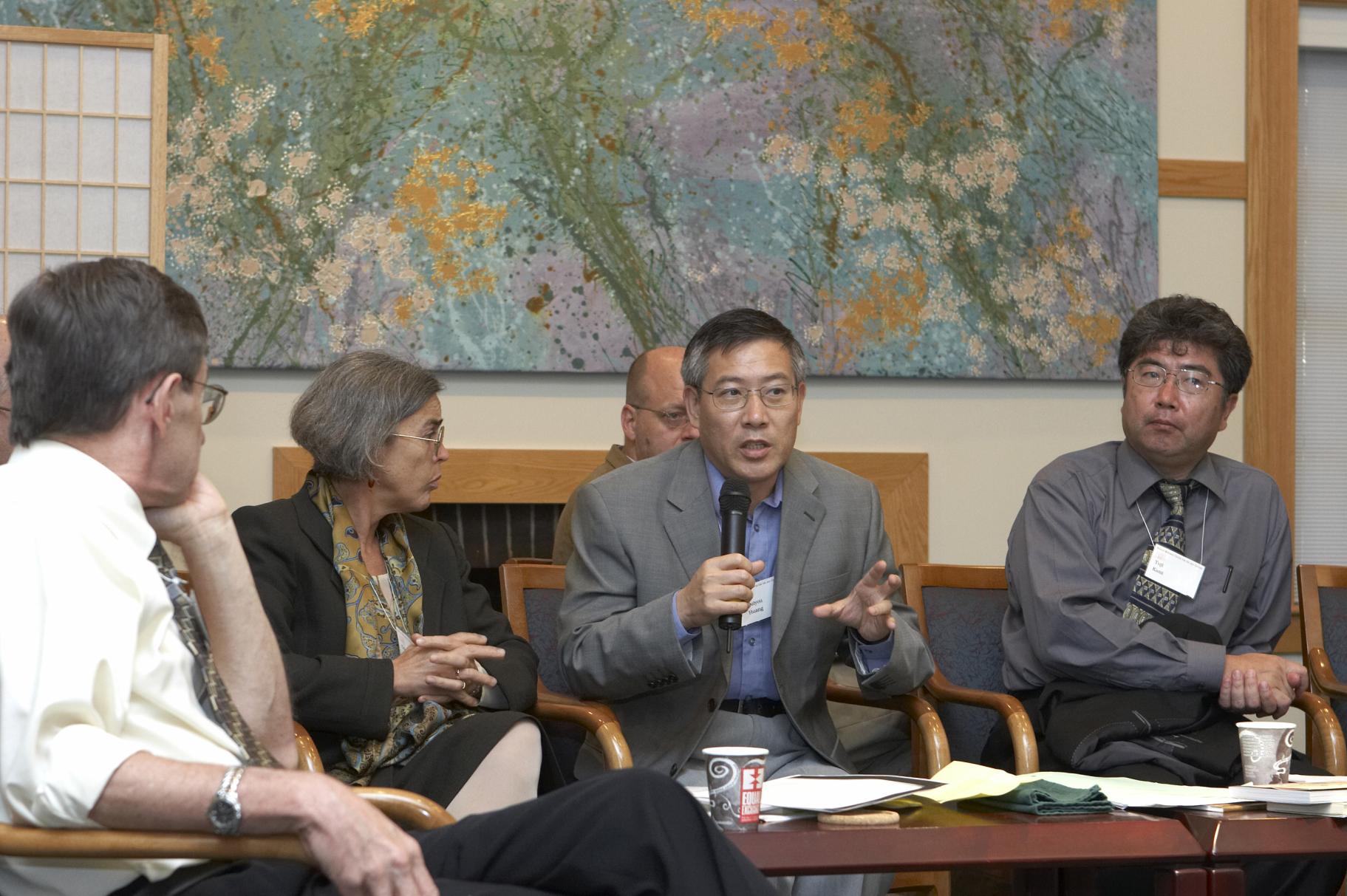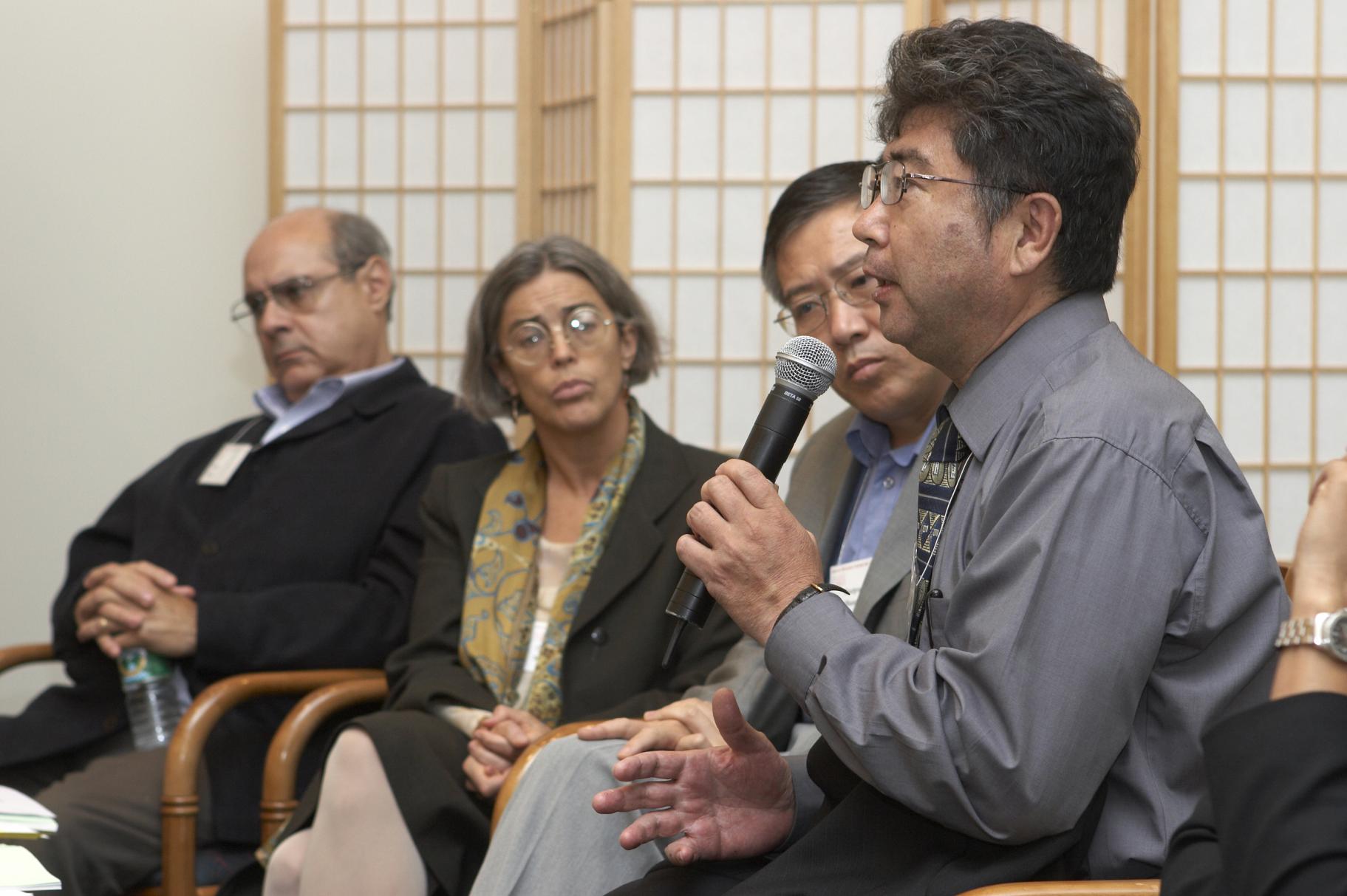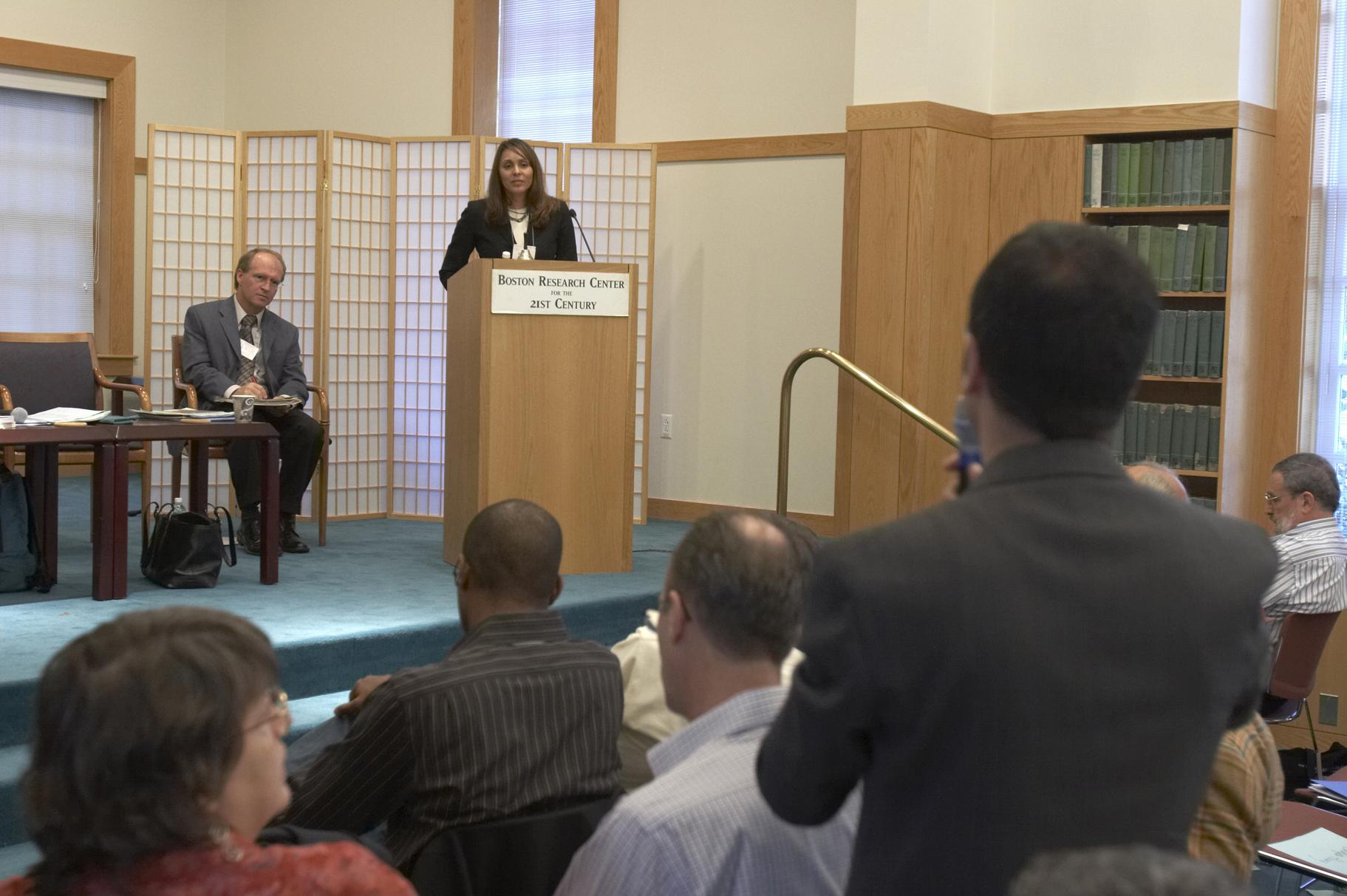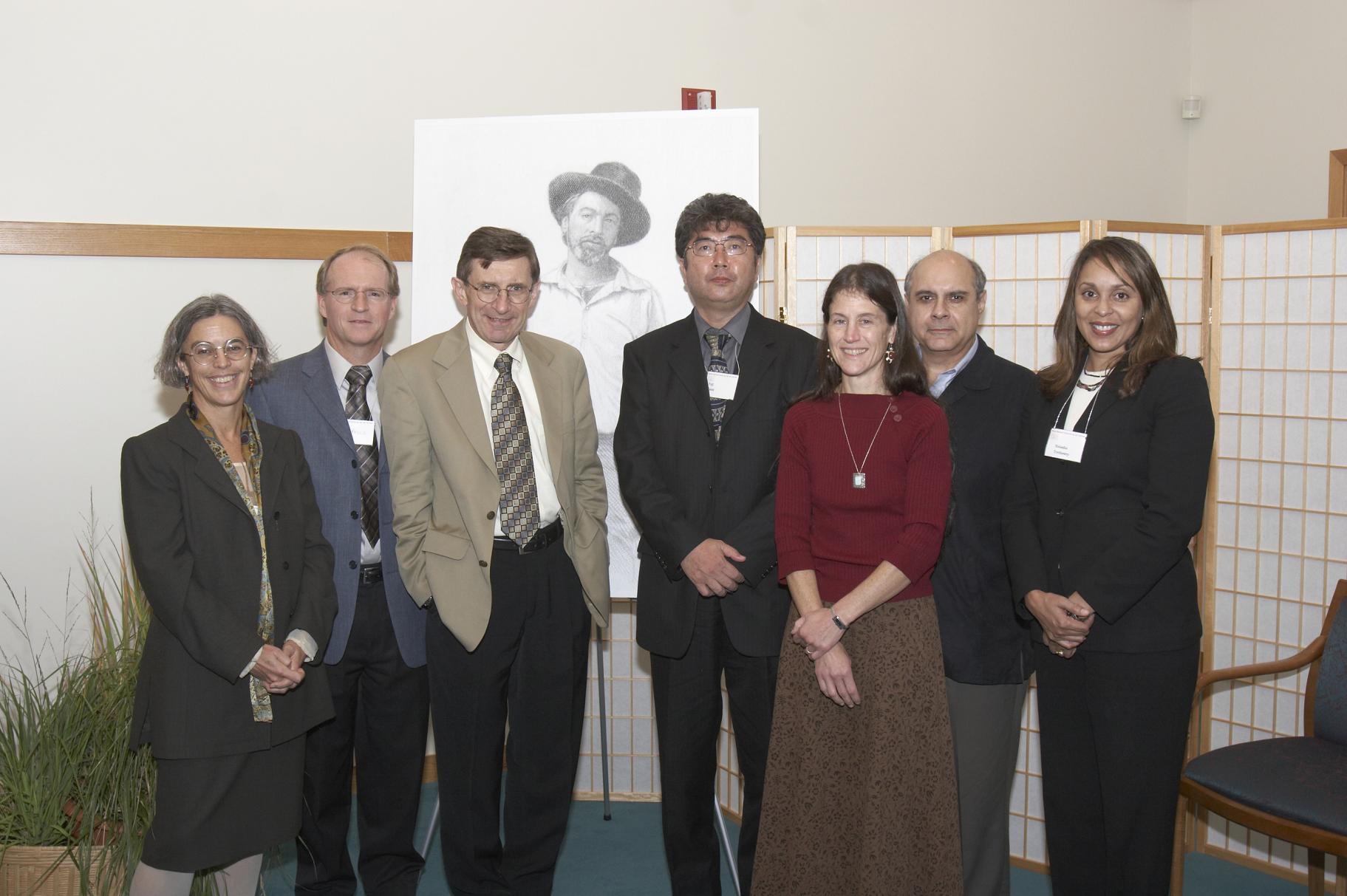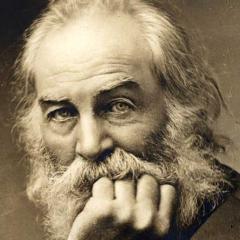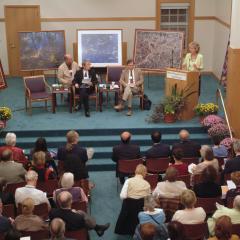2005 Ikeda Forum: "Talking Back" to Whitman
2005 Ikeda Forum panel presenting at the stage
On October 1, 2005, the Center held the second annual Ikeda Forum for Intercultural Dialogue. In commemoration of the 150th anniversary of Whitman’s masterpiece, Leaves of Grass, the theme of this year’s Forum was “‘Talking Back’ to Whitman: Poetry Matters.” Scholars and poets from Asia and the Americas gathered to listen, learn, and respond to Whitman’s poetic vision.
Welcoming Remarks
In his welcoming remarks, Center President Masao Yokota said that Daisaku Ikeda, poet, peace activist, and president of Soka Gakkai International (SGI), believes that common spiritual ground and a pathway to peace can be discovered through poetry. He said that “For Dr. Ikeda, the reading and writing of poetry has always been one of the most important ways for him to connect with others.” Ikeda has long been inspired by Walt Whitman; when he founded Soka University in Japan in l971, he proposed that a statue of Whitman be built on the campus. Yokota further explained that Dr. Ikeda has reached out to scholars and leaders in the West to promote East/West dialogue. The Center established the Ikeda Forum for Intercultural Dialogue in 2004 to honor his example and to continue this tradition.
Recalling his first exposure to Whitman’s “Passage to India” as a student in Japan, Yokota spoke of the poet’s optimistic approach to East/West understanding. He explained that the India referred to in the poem is not a mere point of geography, rather it symbolizes the wisdom of unity, a spiritual place where people can find a common ground amidst their differences. “Whitman’s India, like Whitman’s poetry,” Yokota said, “is large enough to hold such difference and wise enough to see the unity in it.”
Yokota relayed Whitman scholar Ed Folsom’s impression of the many commemorations of Leaves of Grass that have been held this year. Folsom said that despite the diversity of opinions on Whitman’s work, all the audiences gather in a spirit of harmony. Yokota commented on how this fits with Ikeda’s aims: “In keeping with Daisaku Ikeda’s hope for the world, it is—above all—harmony that should characterize East/West dialogue. This, I believe, is the essence of a Whitmanian atmosphere.”
Executive Director Virginia Benson explained that last year’s Forum led to a desire to bring the wisdom of poetry into conversations for peace. Considering the many conflicts in the world today, she suggested a discussion about Whitman’s vision of democracy would be a suitable celebration of Leaves of Grass. Benson quoted from an editorial published in the Boston Globe by Professor David S. Reynolds of City University of New York: “More powerfully than any other literary work, the 1855 Leaves of Grass reminds all human of their identity as fellow sojourners on this earth. If Whitman’s spirit were universally accepted, social tensions and personal anxiety would diminish.”
Walt Whitman in Context
Joel Myerson, Professor Emeritus of American Literature at the University of South Carolina, expressed appreciation to the staff of the Center for organizing the Forum. Continuing, Myerson recalled seeing an early Japanese translation of Leaves of Grass belonging to Dr. Ikeda when he and Professor Ron Bosco spoke at Soka University in Japan in 2001. Myerson then situated Whitman’s life and work in historical and literary context. Whitman was born in May 1819 on Long Island, New York, left school at age eleven to help support his family, and found a job on the staff of a local newspaper. Later, he taught for several years while working as a journalist. In 1841, he moved to New York and published a temperance novel. Up until the publication of Leaves of Grass, Whitman’s journalism career was undistinguished. Myerson observed that although Whitman is now considered a classic American writer, this was not always the case. Myerson said: “It is fair to say that if Walt Whitman died prior to 1855, he would be nothing more than a footnote to histories of American journalism and fiction writing, for his early publications gave no indication of the achievements to follow.”
In 1855, Whitman published the first edition of a volume of poem called Leaves of Grass. He became an independent journalist in 1859. Three years later he visited Washington to find his brother who had been wounded in the Civil War, and, remaining there, he nursed wounded soldiers in the hospital. He received various government appointments and continued to publish new editions of Leaves of Grass among other works. He moved to Camden, New Jersey, after suffering a stroke in 1873, where he lived until his death in March of 1892.
Myerson described the exciting and turbulent years surrounding the publication of Whitman’s masterpiece. The American population increased rapidly during this period and many other great literary works were published immediately prior to Whitman’s: Thoreau’s “Civil Disobedience”(1849), Hawthorne’s Scarlet Letter (1850), Melville’s Moby Dick (1851), Stowe’s Uncle Tom’s Cabin by (1852), and Thoreau’s Walden (1854). The Fugitive Slave Bill, the Kansas-Nebraska Act, and events like South Carolina’s secession from the Union and other precursors to the Civil War formed the historical backdrop for Whitman’s work.
But Leaves of Grass received lukewarm acclaim. The book was assailed as immodest and “quite out of place amid the decorum of modern society,” according to Myerson. In fact, the only positive reviews were written anonymously by Whitman himself. There were however notable exceptions: Abraham Lincoln approved of the book and Ralph Waldo Emerson wrote Whitman an enthusiastic letter of congratulations.
Modern literary scholars now agree that Whitman’s poetry was “a watershed in American literary history,” Myerson explained, noting that by rejecting the formal structures of traditional poetry in favor of free verse and replacing commas and periods with ellipses, Whitman opened the way for later poets to experiment stylistically.
Myerson elaborated by suggesting that Whitman’s verse was a far cry from the poetry of the day that ignored sex, rarely dealt with contemporary life, and was written in highly formal and prescribed poetic language. He pointed out that Whitman was a man of enormous physicality who introduced eroticism into mainstream American poetry, thus making his verse sensuous in an age of decorum. Referring to Whitman as “the great poet of democracy,” Myerson noted that his writing contains elaborate catalogues of Americans, their occupations, and their lives, all presented with a spirit of egalitarianism. This interconnectedness of citizens was intended to evoke the equality of all.
Myerson said Whitman considered himself a man of the people employing the language of the people, and he was in fact one of the first American poets to embrace the speech of the street. Myerson concluded that Whitman’s work, which reflected America and American life in the 1850s and 1860s, has served as a model for future poets, not only in America but throughout the world.
The Power of the Poetic Voice
Sarah Wider, professor of English at Colgate University, presented a paper entitled “The Power of the Poetic Voice,” which underscored the vital role that poetry, the poets, and the readers of poetry must play in the creation of a just world. The word poetry, Professor Wider explained, comes from the Greek poesis, meaning “to make or create”; the poet creates hope and meaning from words, in their own voice. She referred to the many political prisoners who were writers and poets: Martin Luther King, Jr. who wrote his “Letter from a Birmingham Jail”; Mahatma Gandhi and his Songs from Prison; Tsunesaburo Makiguchi, who died in prison opposing Japan’s militarism; and Josei Toda, who was released and continued his mission, followed by Daisaku Ikeda who carries on that work in his poetry.
She said the power of poetry is contained in the voice; poetry and voice are inseparable. Wider explained that in order for a voice to be heard, at least two people must be present; therefore, the voice provides connection and interconnection without which there is no power. She observed that the word “power” derives from “posse”—to be able—but unfortunately, the word has become associated with military aggression. She asserted, “I want to reclaim that poor word ‘power.’ Give it back its voice of enabling,” adding that the power of poetry enables us to see ourselves in relation to others, rather than in isolation. Wider quoted Emerson, who said in response to a poem: “I shall see and comprehend my relations.” Wider said Whitman loved poetry because it made the world more expansive and connected. This, she went on, fits with the belief of Daisaku Ikeda, who says poetry is the work that should be done by world leaders. To emphasize her point, Wider quoted from his collection entitled Fighting for Peace:
You who wield power!
It is up to you
to offer the world
the highest example and model
By rights you should be poets.
Wider concluded it is up to the poets to bear witness, affirm relations, and speak for the silenced, rather than wait for the world leader to fight for justice and work for peace. “We need our poets more than ever today…I think we have only one choice. We must speak with the voices we long to hear,” she concluded to prolonged applause.
“Talking Back” to Whitman
In his keynote address, Ed Folsom, professor of English at the University of Iowa, expanded on the powerful phenomenon of “talking back” to Whitman. He said that Whitman realized a key element in creating a true democracy lay in the improvement of Americans’ reading habits and sought to engender “an active, argumentative, tough democratic reader who would not easily accept the lessons of any author or authority.” According to Folsom, Whitman wanted his readers to question, interact with his poetry, and not be passive. He quoted from Whitman’s prose work Democratic Vistas: “The process of reading is not a half-sleep but an exercise, a gymnast’s struggle; that the reader is to do something for himself, must be on the alert, must… construct indeed the poem, argument, history… Not that the book so much needs to be the complete thing, but the reader of the book does.”
Folsom expressed his appreciation to the Center for dedicating this year’s Ikeda Forum to talking back to Walt Whitman. He felt this was not so much a tribute to Whitman as an opportunity to enter into dialogue, or argument, with the poet. In Folsom’s opinion, it is a most fitting approach since Whitman himself wanted nothing more than for us to challenge what we read. Folsom described how poets of diverse backgrounds have been responding to Whitman for a century and a half, which makes him “the most talked back to of all writers in the history of the world.”
He reported that one of the longest and most important bouts of talking back to Whitman is the African-American response. Focusing on the work of Langston Hughes, Folsom demonstrated how Hughes responded to Leaves of Grass and incorporated Whitmanian themes into his poetry.
In particular, Hughes focused on Whitman’s idiom borrowed from street slang, “So long!” with which he concluded every edition of Leaves of Grass beginning in 1860. Whitman used the phrase both in the sense of “till we meet again” and to express yearning for a deferred desire or dream. In Folsom’s view, the use of this phrase indicates Whitman’s concern at how long it will take America to realize her ideals of democracy. He observed, “Whitman ends his book, then, announcing a political utopia and then sealing it with a deferral, ‘So long!’” It’s a poem saying ‘so long’ to the America that compromised its revolutionary ideals in a tainted constitution, a poem unfolding those ideals in lines that will wait so long as it takes to have them realized.”
Folsom demonstrated how Whitman’s “So long” was echoed in the opening pages of Hughes’ Selected Poems in 1960, by reading the line “So long/ So far away/Is Africa,” from Hughes’ poem entitled “Afro-American Fragment.” Folsom commented, “It is no accident that the African-American poet most indebted to Whitman would make this gesture of picking up where Whitman left off, using that slippery and evocative phrase, ‘so long’ as the pivot between a book written just on the edge of the Civil War… and a book just written on the edge of the second great battle for civil rights for black Americans.”
Folsom discussed two other poems by Hughes, “So long” and “Old Walt,” which also depict a sense of yearning in the face of a dream deferred. Folsom described how Hughes “has learned from Whitman that ‘so long’ is indeed ‘in the song’ of America, with deferral woven into the American Dream for blacks.” Both poets, he said, placed “so long” between the failed history of equality and the dream of democracy. He further elucidated the significance of the Whitman-Hughes relationship in the latter’s choice of placing the poem “Freedom’s Plow” at the end of his Selected Poems. The voice and punctuation of that poem echo a Whitmanian style, and the phrase “hold on” resonates with “so long.” Before he read “Freedom’s Plow” aloud, Folsom said that in this poem Hughes claims “co-equality with Whitman as the voice of the culture:”
A long time ago,
An enslaved people heading toward freedom
Made up a song:
Keep Your Hand On The Plow! Hold On!
That plow plowed a new furrow
Across the field of history.
Into that furrow the freedom seed was dropped.
From that seed a tree grew, is growing, will ever grow.
That tree is for everybody,
For all America, for all the world.
May its branches spread and its shelter grow
Until all races and all peoples know its shade.KEEP YOUR HAND ON THE PLOW!
HOLD ON!
Commenting that the message of this poem is ultimately optimistic, even in the face of continued racial inequality in America, Folsom repeated the Whitman-Hughes refrain: “It will still take ‘so long.’ It will require us to ‘hold on.’”
Struggles of Identity: Whitman Among Feminist Poets
The afternoon session consisted of an international panel of distinguished scholars and poets chaired by Kenneth Price, professor of American Literature at the University of Nebraska, who introduced the first panelist of the afternoon session, Cristanne Miller, professor of English at Pomona College. She provided a feminist response to Whitman by referring to Muriel Rukeyser, the first 20th century female poet to write about Whitman’s influence on her verse. Rukeyser recognized that Whitman was engaged in a struggle for identity. She wrote, “To Walt Whitman… the discovery of his nature was a continual crisis… In the poems, his discovery of himself is the discovery of America.” Miller argued that Whitman’s poetry resonated with the feminist poets of the 1950s, 1960s, and 1970s because of this struggle for identity, his writing of and from the body, and his sexual openness and egalitarianism.
Miller examined several poems of Adrienne Rich, whose volume of poems Dream of a Common Language shares similarities with Whitman’s “Song of Myself.” Miller explained how Rich’s work has dispersed a Whitmanian poetic in the twentieth century; like Whitman, she writes in unrhymed and unlettered lines and in a voice that is both singular and inclusive. Rich’s poetry, in Miller’s view, resembles Whitman’s in her celebration of the ordinary, humble things of everyday life. Rich’s poetry has had a profound influence on feminist thought, and the poet sees her work as a vehicle for political and social change. “Both Whitman and Rich regard the work of the poet ethically. As Whitman says, the poet should be ‘the voice and exposition of liberty,’” Miller said, though each fulfilled this role in different ways. Miller observed that in more recent feminist poetry, less concerned with struggles for identity and sexual liberation, Whitman’s voice is not as central as it was to the earlier generation of women poets.
Politicizing Whitman’s Poetry in 20th Century China
Guiyou Huang, dean of Undergraduate Studies at St. Thomas University, discussed Whitman’s influence on Chinese literature and patriotism. Whitman’s work first appeared in China in the period after the student revolution of May 1919. He explained that three prominent Chinese writers and political figures studied Whitman’s work: Tian Hian, a playwright and author of the Chinese national anthem, found Whitman’s poetry useful in the effort to reinforce a Chinese spirit to prevent the country from sinking back into feudalism; Guo Moruo, one of China’s most important poets, a playwright, paleographer and president of China’s Academy of Sciences, wrote Whitmanian poetry in the 1930s; and the famous poet Ai Qing found inspiration in Whitman’s poetry to encourage the Chinese people to fight for their national sovereignty when Japan invaded China. In addition, the three translators of Whitman into Chinese were very influential in Chinese literary and political life: Chu Tunan was Vice Chairman of the Peoples’ Congress and chairman of the League of Democracy; Lucy Chen, a professor; and Li Yegnang, a poet and critic who also wrote a biography of Whitman.
Whitman’s Progressive Politics: The Case of Latin America
The complex impact and reception of Whitman, his poetry, and his progressive politics was discussed by Enrico Mario Santí, professor of Hispanic Studies at the University of Kentucky. Whitman’s work was introduced to Latin America in 1882 with the poet Jose Martí’s portrait of the author and defense of Leaves of Grass. Since then, numerous Spanish translations of Leaves of Grass have been published and many Latin American poets have used Whitmanian verse to respond to U.S. political and military aggression. Santí quoted the first line of Ruben Dario’s 1902 poem “Ode to Roosevelt:” “It’s with Whitman’s verse that I address you.” Santi emphasized how the reality of U.S. - Latin American relations often worked against Whitman’s predominant themes.
He also cited various examples of how the respect for life and freedom found in Whitman was absent from Latin American countries that ignored the rights of their citizens. “Whitman’s Democracy,” Santí said, “in the sense of a respect for representative government and equal opportunity, has not translated well into Latin America.” Santi read from Guatemalan poet Pedro Mir’s, “Countersong to Walt Whitman,” in which Mir replaces Whitman’s multi-dimensional ‘I’ with the more communal ‘we.’ Mir shifts the pronoun to ‘we,’ explained Santí, to criticize the selfishness of the United States. “In Mir’s visionary ‘Countersong,’” Santí explained, “the Whitmanian migrates onto the new pioneering lands of Central and South America… where the true spirit of Whitman’s ‘America’ is being fulfilled.”
The Poet of the People: A Japanese Buddhist Response
Yuji Kami, professor of American Literature at Soka University in Japan continued the intercultural presentations with a Japanese Buddhist response to Whitman. Whitman was introduced to Japan in 1892 by the novelist Souseki Natsume. The form and content of Whitman’s poetry appealed to Japanese writers for its message of self-discovery and inner exploration and because it offered to them a departure from their own rigid literary conventions. With this as background, Kami focused on the connection between Whitman and Daisaku Ikeda.
Ikeda first encountered Saika Tomita’s Japanese translation of Leaves of Grass in 1951. Ikeda recognized Whitman as a kindred spirit and described him as “a man of the universe.” Kami said the Japanese religious leader and poet was deeply moved by Leaves of Grass, and wrote, “when in the midst of those gray and troubled times, I learned from that book the secret of how to face the future; my initial admiration gave way to an intense affection.” Ikeda articulated that Whitman’s poems gave him the confidence to pursue his life’s work for peace. In 1992, Ikeda wrote a poem to Whitman on the centenary of Whitman’s passing. A portion of the poem, “Like the Sun Rising,” was read aloud. Kami commented on the significance of this “writing back” to Whitman by Ikeda:
Thus, the cross-cultural dialogue between Whitman and Ikeda can be considered an ongoing project, one that started when Ikeda was an obscure young man and one that continues today when Ikeda, through his writing and his leadership of the global SGI movement of lay Buddhists, has become an important world figure.
”Kami drew comparisons between Whitman and Ikeda’s poetry both in terms of style and thematic content. Ikeda’s poetic voice, Kami noted, departs from the formality, delicacy, and ambiguity typical of Japanese poetry. The uniqueness of Ikeda’s voice, especially in his longer works, reveals an “on-going dialogue” with Whitman in its expansiveness and as it seeks to bridge the inner life, the life of society, and that of the cosmos to discover “the sublime and eternal in all being.” Ikeda writes long poems to the common people, whom he respects and describes as “experts in the art of daily living.” Kami said that through his poetry, Ikeda “seeks to communicate the very elements of ‘courage, passion, the future’ that he discovered so abundantly in Whitman.”
Kami observed that Ikeda has always upheld the notion that we must establish “divinity” within the individual in order to create a peaceful world. “For Ikeda,” he said, “this awakening is the source of revitalization that can spread through relations in families, friendships and communities.” He explained how in Mahayana Buddhism and the philosophy of the Lotus Sutra, the foundation of Ikeda’s inspiration, the fully-actualized individual who is enriched by positive engagement is referred to as the Greater Self. In his lecture at Harvard Divinity School in 1993, Ikeda likened the Buddhist Greater Self to Whitman’s “actual Me,” by quoting lines from Whitman’s “Passage to India:”
But that I, turning, call to thee O soul, thou actual Me,
And lo, thou gently masterest the orbs,
Thou matest Time, smilest content at Death
And fillest, swellest full the vastness of space.
Ikeda’s poetry responds directly to Whitman by celebrating our true nature, our authentic self, and our infinite potential to create a Whitmanian utopian democracy.
On Whitman, Civil War Memory and My South
Appropriately, the final presenter was poet Natasha Trethewey who exemplified the spirit of “talking back” when she read several of her poems about the forgotten black regiments of the Civil War in response to the absence of black people in Whitman’s work. In this context, Trethewey expressed Whitman’s and her own complex relationship with the South as she read lines from his poem “O Magnet South:”
O magnet South! O glistening perfumed South! My South!
O quick mettle, rich blood, impulse and love! Good and evil! O dear all to me!
Whitman praised the South and its landscape, but, she acknowledged, he despised other elements of Southern life — primarily slavery. Trethewey recognized that, although Whitman’s poetry has come to represent the poetics of democracy and anti-racism, he nonetheless perpetuates the dominant myth that people of color had freedom bestowed upon then when he fails to underscore the role of black Civil War soldiers. In her view, these “erasures” are consistent with the relegation of blacks “to the margins of public memory.”
Trethewey admires Whitman’s work but due to her research into the forgotten black soldiers and the negation of the legitimacy of her own birth as an African-American woman in her home state of Mississippi, she cannot overlook contradictions in Whitman’s work. Trethewey’s work “talks back” to these erasures, omissions, and things “revealed both intentionally and inadvertently” in Whitman’s poetry, even as it shares a sense of ambivalence about the South. “Like him,” Trethewey expressed, “I love my South. And I hate it too.”
Conclusion
Throughout the day, the audience and panelists were actively engaged in “talking back” to Whitman and listening to each other. Following each panelist’s presentation, there were spirited discussions, questions, and debates focused on the role of poetry in modern America, the absence of listening in our culture, and the importance of fostering mindful readers and not just great poets. Presenters and attendees alike discussed Whitman the man and Whitman the poet, his shortcomings, his silences, and his vision of a “universal democracy.” The poet himself would have enjoyed witnessing the stimulating, cross-cultural dialogue inspired by Leaves of Grass 150 years after its publication. The atmosphere of the day was reminiscent of some lines from Whitman’s poem “Starting from Paumanok:”
See, projected through time,
For me, an audience interminable.
With firm and regular step they wend—they never stop,
Successions of men, Americanos, a hundred millions;
One generation playing its part, and passing on;
Another generation playing its part, and passing on in its turn,
With faces turn’d sideways or backwards towards me, to listen,
With eyes retrospective towards me,…
Democracy!
Near at hand to you a throat is now inflating itself and joyfully singing.
Photos by Marilyn Humphries
